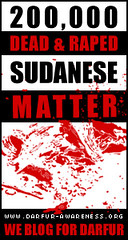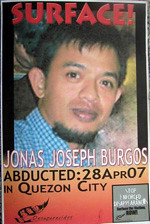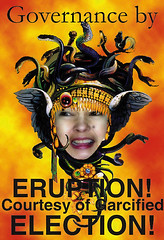Can a third force win in the 2010 Philippine elections?
That the Kapatiran party actually had to issue a press statement seeking interested candidates to join its national and local line ups for the 2010 elections is a testament to the sorry state of third-party politics in the Philippines. You want to be a candidate for vice president or senator? Just visit the party's web site, send the party organizers a note expressing your interest, and you could be Kapatiran's official candidate. It's a good way to recruit members and expand its grassroots base for sure, but clearly, it banners the sad fact that the party does not have the bench strength to field its own vetted cadre of leaders.
The major reason of course why third parties have trouble challenging established parties, other than sheer organizational ineptness, is money. Give the Kapatiran a busload of cash (make that several busloads), and political bandwagons will trail them in no time. In the U.S., one of the more successful third-party runs in recent memory was that of Ross Perot, garnering a remarkable 19 percent of the national vote in 1992. Perot was a billionaire, so funding was not an issue.
One instance when a "billionaire" was going to do a Ross Perot in the Philippines was Eddie Gil in 2004. Gil actually promised to just pay off the entire Philippine national debt ($53 billion), so the country could start on a clean slate (imagine the savings in not having to pay interest). It turned out, not surprisingly to many jaded observers of Philippine politics, Gil was not the real McCoy. One day he was detained for using worthless checks for his hotel bills while campaigning. The guy reportedly was nothing but a con man, with nothing but fake property deeds and phony documentation of his wealth.
To be sure, pockets of successes indicate the possibility of victory over traditional politicians awash with cash. But the few David vs. Goliath stories are mostly in local contests, where an incumbent manages to lose all credibility often by self-destruction, and thus a decent challenger becomes well-positioned to launch an issue-oriented (read: negative) campaign and draw mostly anti-incumbent votes. Vigilant supporters, a media unafraid to report anomalies, and an active local election watchdog can help contain any vote-rigging money can buy.
At the national level, it requires billions (the amount bandied about is between 2 to 3 billion pesos) to run a presidential campaign that is able to mobilize down to the election-watcher level. One exceptional case was when now Senator Miriam Santiago ran for office in 1992. A one-woman thunderstorm, Santiago almost won the elections without the benefit of a well-oiled political machine. Unfortunately, the prospect that another Santiago will emerge is a snowball's chance in hell. Even Santiago herself, if she decides to run again, will be a faint shadow of her old (but at that time infinitely refreshing and entertaining) political persona.
It's important to note that one factor that helped Santiago launch a credible presidential campaign was the support of a major media organization (ABS-CBN). It helps to have a giant network provide you free media mileage (especially inviting you as guest in top-rated shows). It also matters that media penetration is now deeper than ever.
In my 1998 book How to Win (or Lose) in Philippine Elections (Anvil), I cited data indicating the growing reach of the media, especially in urban centers. Between 1970 and 1993, for example, access to radio grew from 48.7 to 81.9 percent, while access to TV grew more dramatically from 5.5 to 49.1 percent. I argued that the more urbanized the Philippines becomes, the greater the chances of issue-oriented candidates to build their case. It's been 16 years since the last referenced data, and public access to media has significantly grown, with close to 90 percent of households now owning a radio receiver and 73 percent now having access to TV. It's certainly a boon to a third-party candidate to have the greater ability to reach voters simply by being in the news or widely broadcast public forums. While TV ads the likes of Villar and Roxas can afford may still be beyond the third-party candidate's budget, it's not exactly impossible to get noticed if that candidate has the savvy to gain free media mileage.
As in the development of most social events and phenomena, "confluence" is the operative word in elections. For a third party to shake up the 2010 Philippine elections, there should be a sufficient mix of favorable variables. What a third party lacks in money can be compensated by a sympathetic media, and the Internet can probably help generate a couple of hundred thousand votes and some funding (unfortunately, that's far from having the same impact as in the 2008 U.S. elections, in which the Obama campaign mobilized supporters and raised millions efficiently through its web site, and arguably won because of it). What it lacks in Miriam-like personality can be compensated by issues that reverberate. Okay, perhaps that's a tad too wishful. Really, it's important to throw in some charisma in the mix—it's the reality of mass elections. Otherwise, it will be business as usual—another well-intentioned and principled run coming to naught or, from pragmatic Machiavelli's point of view, just a bunch of people trying to deal with voters as they wish the electorate to be, not as the voters really are.
The major reason of course why third parties have trouble challenging established parties, other than sheer organizational ineptness, is money. Give the Kapatiran a busload of cash (make that several busloads), and political bandwagons will trail them in no time. In the U.S., one of the more successful third-party runs in recent memory was that of Ross Perot, garnering a remarkable 19 percent of the national vote in 1992. Perot was a billionaire, so funding was not an issue.
One instance when a "billionaire" was going to do a Ross Perot in the Philippines was Eddie Gil in 2004. Gil actually promised to just pay off the entire Philippine national debt ($53 billion), so the country could start on a clean slate (imagine the savings in not having to pay interest). It turned out, not surprisingly to many jaded observers of Philippine politics, Gil was not the real McCoy. One day he was detained for using worthless checks for his hotel bills while campaigning. The guy reportedly was nothing but a con man, with nothing but fake property deeds and phony documentation of his wealth.
To be sure, pockets of successes indicate the possibility of victory over traditional politicians awash with cash. But the few David vs. Goliath stories are mostly in local contests, where an incumbent manages to lose all credibility often by self-destruction, and thus a decent challenger becomes well-positioned to launch an issue-oriented (read: negative) campaign and draw mostly anti-incumbent votes. Vigilant supporters, a media unafraid to report anomalies, and an active local election watchdog can help contain any vote-rigging money can buy.
At the national level, it requires billions (the amount bandied about is between 2 to 3 billion pesos) to run a presidential campaign that is able to mobilize down to the election-watcher level. One exceptional case was when now Senator Miriam Santiago ran for office in 1992. A one-woman thunderstorm, Santiago almost won the elections without the benefit of a well-oiled political machine. Unfortunately, the prospect that another Santiago will emerge is a snowball's chance in hell. Even Santiago herself, if she decides to run again, will be a faint shadow of her old (but at that time infinitely refreshing and entertaining) political persona.
It's important to note that one factor that helped Santiago launch a credible presidential campaign was the support of a major media organization (ABS-CBN). It helps to have a giant network provide you free media mileage (especially inviting you as guest in top-rated shows). It also matters that media penetration is now deeper than ever.
In my 1998 book How to Win (or Lose) in Philippine Elections (Anvil), I cited data indicating the growing reach of the media, especially in urban centers. Between 1970 and 1993, for example, access to radio grew from 48.7 to 81.9 percent, while access to TV grew more dramatically from 5.5 to 49.1 percent. I argued that the more urbanized the Philippines becomes, the greater the chances of issue-oriented candidates to build their case. It's been 16 years since the last referenced data, and public access to media has significantly grown, with close to 90 percent of households now owning a radio receiver and 73 percent now having access to TV. It's certainly a boon to a third-party candidate to have the greater ability to reach voters simply by being in the news or widely broadcast public forums. While TV ads the likes of Villar and Roxas can afford may still be beyond the third-party candidate's budget, it's not exactly impossible to get noticed if that candidate has the savvy to gain free media mileage.
As in the development of most social events and phenomena, "confluence" is the operative word in elections. For a third party to shake up the 2010 Philippine elections, there should be a sufficient mix of favorable variables. What a third party lacks in money can be compensated by a sympathetic media, and the Internet can probably help generate a couple of hundred thousand votes and some funding (unfortunately, that's far from having the same impact as in the 2008 U.S. elections, in which the Obama campaign mobilized supporters and raised millions efficiently through its web site, and arguably won because of it). What it lacks in Miriam-like personality can be compensated by issues that reverberate. Okay, perhaps that's a tad too wishful. Really, it's important to throw in some charisma in the mix—it's the reality of mass elections. Otherwise, it will be business as usual—another well-intentioned and principled run coming to naught or, from pragmatic Machiavelli's point of view, just a bunch of people trying to deal with voters as they wish the electorate to be, not as the voters really are.
************************************************************************
 Marvin Bionat is the creator of PhilippineUpdate.com, a news and views site that has served as a virtual platform that promotes various advocacies, including the political empowerment of overseas Filipinos and accountability in government. He wrote the National Bookstore bestseller How to Win (or Lose) in Philippine Elections (Anvil Publishing, 1998) and is now based in the
Marvin Bionat is the creator of PhilippineUpdate.com, a news and views site that has served as a virtual platform that promotes various advocacies, including the political empowerment of overseas Filipinos and accountability in government. He wrote the National Bookstore bestseller How to Win (or Lose) in Philippine Elections (Anvil Publishing, 1998) and is now based in the Read more articles by Marvin Bionat
************************************************************************

POGB will not sell, exchange, use or allow any 3rd party access to your email for
any other purposes without exception, email exclusively for article updates only.
























2 Speak Out:
If only we have a media where their practitioners are true to their profession and not susceptible to the allure of ATM journalism, an independent may just have a chance. On the other hand it is still a party with the machinery and resources that dictates the outcome of the election especially when the system is patronage based and are easily manipulated with increbedol back door operators.
Well, I'm just hope for a clean and safe election this 2010. And who ever wins as the race for presidency, I wish he/she can change our country from its current state. Anyway, I've been looking for topics as interesting as this. Looking forward to your next post.
-pia-
Post a Comment